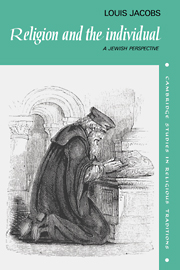Book contents
- Frontmatter
- Contents
- Preface
- List of abbreviations
- 1 Individual significance
- 2 Self-realization as a religious value
- 3 Attitudes to life and death
- 4 Family relationships
- 5 Loving the neighbour
- 6 Communal obligations
- 7 God and the soul
- 8 Does a person's body belong to God?
- 9 Worship with the body
- 10 God and personal freedom
- 11 Immortality
- 12 Conclusion: A question of emphasis
- Glossary
- Notes
- Bibliography
- Index
4 - Family relationships
Published online by Cambridge University Press: 11 October 2009
- Frontmatter
- Contents
- Preface
- List of abbreviations
- 1 Individual significance
- 2 Self-realization as a religious value
- 3 Attitudes to life and death
- 4 Family relationships
- 5 Loving the neighbour
- 6 Communal obligations
- 7 God and the soul
- 8 Does a person's body belong to God?
- 9 Worship with the body
- 10 God and personal freedom
- 11 Immortality
- 12 Conclusion: A question of emphasis
- Glossary
- Notes
- Bibliography
- Index
Summary
The family both circumscribes and broadens the horizons of its members, each individual member having a dual role, as a person in his or her own right and as father or mother, son or daughter, brother or sister, husband or wife, with the extended relationships of grandparents, grandchildren, uncles, aunts, nephews, nieces, cousins, parents-in-law, children-in-law, step-parents and step-children.
In the Jewish tradition, these family relationships are carefully graded so that the closer the relationship the greater the degree of personal responsibility. Thus in Jewish law the mourning rites to be observed on the death of a near relative are limited to the seven closest relatives: father, mother, son, daughter, brother, sister, husband, wife. Of these seven, the mourning period for a parent extends for a whole year while for the other five for one month. Maimonides remarks that to fail to observe the mourning rites for a near relative is to be ‘cruel’, i.e. it is evidence that the loving relationship that ought to have been present when the relative was alive was totally absent. The individual who fails to mourn the loss of a near relative has a deficiency in his character. By allowing his individuality to gain so completely the upper hand as to sever his family relationship he diminishes that very individuality.
Similarly, with regard to almsgiving, the nearer a relative the greater an obligation to assist him when he is in need. Poor parents take precedence over other relatives, closer members of the family over more distant relatives and members of the family over strangers.
- Type
- Chapter
- Information
- Religion and the IndividualA Jewish Perspective, pp. 20 - 24Publisher: Cambridge University PressPrint publication year: 1992

